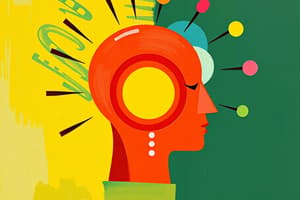Podcast
Questions and Answers
What is a key component of critical thinking?
What is a key component of critical thinking?
- Learning to repeat what others say
- Interpreting and evaluating what you read or hear (correct)
- Accepting information without questioning it
- Memorizing facts for future use
How does critical thinking influence judgment?
How does critical thinking influence judgment?
- It often leads to rushed conclusions
- It prioritizes personal bias over evidence
- It uses emotions primarily to make decisions
- It involves making informed decisions based on analysis (correct)
Which of the following best describes critical thinking?
Which of the following best describes critical thinking?
- A systematic approach to questioning and evaluating information (correct)
- A way to enhance memory retention
- A process of blindly accepting beliefs
- A means to analyze data without forming judgments
What aspect does critical thinking NOT involve?
What aspect does critical thinking NOT involve?
Which action is MOST associated with critical thinking?
Which action is MOST associated with critical thinking?
Flashcards
Critical thinking
Critical thinking
Examining information to form an opinion and judgment.
Analyzing information
Analyzing information
Breaking down information into parts to understand it better
Interpreting information
Interpreting information
Explaining the meaning of information.
Evaluating information
Evaluating information
Signup and view all the flashcards
Forming a judgment
Forming a judgment
Signup and view all the flashcards
Study Notes
Defining Critical Thinking
- Critical thinking involves a systematic process of questioning, analyzing, interpreting, evaluating, and forming judgments about information.
- It's not passive consumption of information, but rather an active engagement with it.
- This process applies to various forms of communication (reading, listening, speaking, writing).
Key Components of Critical Thinking
- Questioning: Involves challenging assumptions, seeking clarification, and identifying inconsistencies.
- Analyzing: Breaking down complex information into smaller parts to understand its structure and identify underlying arguments.
- Interpreting: Understanding the meaning and implications of the information.
- Evaluating: Assessing the credibility, validity, and relevance of the presented information. This includes considering biases, evidence, and supporting arguments.
- Judging: Forming reasoned conclusions based on the analysis, interpretation, and evaluation. This involves making informed decisions and taking a stand.
Applications of Critical Thinking
- Problem-solving: Identifying problems, analyzing causes, exploring solutions, and evaluating their effectiveness.
- Decision-making: Considering various options and evaluating their potential risks and benefits.
- Learning: Actively constructing knowledge through questioning, evaluating, and synthesizing information.
- Communication: Presenting arguments clearly, identifying fallacies, and engaging in thoughtful dialogue.
Characteristics of Critical Thinkers
- Intellectual curiosity: A desire to learn and understand.
- Open-mindedness: Willingness to consider different perspectives and viewpoints.
- Intellectual humility: Recognizing limitations and acknowledging when one doesn't have all the answers.
- Intellectual perseverance: Willingness to persist in problem-solving even when facing difficulties.
- Fair-mindedness: Treating all sides of an issue with equity and fairness.
- Self-awareness: Understanding one's own biases and assumptions.
Obstacles to Critical Thinking
- Emotional biases: Feelings and personal experiences affecting judgments.
- Confirmation bias: Seeking out information that supports pre-existing beliefs.
- Cognitive biases: Mental shortcuts that can lead to flawed reasoning.
- Lack of information: Insufficient evidence or data for making informed judgments.
- Prejudice: Preconceived notions about people or issues.
- Oversimplification: Simplifying complex problems without considering relevant details.
- Overgeneralization: Making broad statements based on limited evidence.
Studying That Suits You
Use AI to generate personalized quizzes and flashcards to suit your learning preferences.




